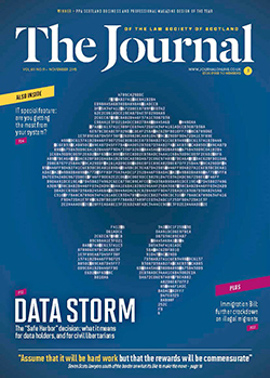The technological edge

The legal profession has gone through a significant period of challenge, and as the dust settles, it is clear that the needs and expectations of clients have fundamentally changed. This delivers one of the biggest challenges, and opportunities, for law firms. It is no longer just about delivering excellent technical legal advice – clients rightly want more for less, good commercial and legal advice, better value for money, more transparency, greater efficiencies and more flexibility from their advisers.
This shift has moved the goalposts and the market is responding in many different ways. It clearly presents an opportunity for law firms who are prepared to innovate and seek to deliver legal services differently.
Implementing substantial change can be a daunting process, but reviewing and challenging internal business processes can be a great way to identify efficiencies across the business, and drawing on innovative technology can help law firms to support the modern needs of clients. The law firms that are prepared to embrace this should have a real competitive edge.
Turn data into knowledge
At the heart of delivering excellent legal service is understanding your clients. Knowing your clients’ business, the pressures they face and the industry landscape they are working in is only half of the battle. Law firms need to understand how they work with a client to add value and improve transparency and service delivery.
Every law firm generates information and a range of data on a daily basis. Consolidating and analysing this information can help shape client relationships and enable law firms to offer real business benefits to their clients.
Innovative business intelligence tools can be a good way to get an in-depth understanding of a client’s business needs. We have been able to identify opportunities to deliver significant business benefits to clients by investing in IT software that can aggregate key financial and case management data from various systems used across the business. This can transform disparate data into usable knowledge, which then allows us to make informed critical decisions on aspects of service delivery or innovation for clients far quicker than before and with more confidence.
In some areas of our business, data are analysed daily and can provide accurate information that offers a real-time snapshot of the activities being undertaken for a client. This process alone brings time-saving benefits, shaving two to three weeks from the traditional spreadsheet-based production method. It also can provide high-level visibility and analysis on a range of financial indicators for our own business, including sales, profitability and recovery rates. This helps us to improve efficiencies and performance for each client, while improving commercial awareness across the firm.
This information helps our business to resource major client accounts effectively, bringing not only improved performance and efficiencies, but potential cost-saving benefits to the client. It also helps to inform our client relationships and highlights opportunities where our expertise, products or services could bring real business benefits to a client, delivering genuine value-add opportunities.
Streamline internal process
Data is a great way to inform and shape how law firms deliver legal service, but why stop there? Undertaking a review of all internal business processes can highlight key areas where technological advances could help increase efficiencies on process based activities and allow fee-earners to dedicate more time to important commercial or more strategic client work.
As a business, we have invested and continue to invest in technology to improve our operational performance across the firm and the services we offer to our clients. This includes working in partnership to create a data extraction tool using optical character recognition technology to scan intercepted mail coming into the firm and route it directly into live matters on the firm’s document management system.
The system routes scanned inbound mail directly into the case management system rather than email, alerting the fee earner when mail is available. It scans 10,000 items of mail per day to London alone, which translates into a reduction in on-site storage from 12 to five linear metres per fee earner and reduces the cost of floor space – creating flexibility for fee earners and supporting DWF’s environmental values.
Building on this, we have implemented printing software that enables fee-earners to print office-specific headed notepaper from an app, regardless of location. This reduces the cost of printing and transporting headed paper to all locations and ensures there is minimal wastage. Clients also have access to the mobile print solutions, and a supported cloud solution enables them to print securely in any DWF office.
Across the business, we have implemented matter-specific scanning, which enables fee-earners to access client documents securely, regardless of their location, and delivers cost and time savings to clients, as work is turned around more efficiently. It also enables our people to work more flexibly – whether on the move, working from home or hotdesking at a client’s office – which can deliver benefits to our employees and allows our business to deliver a more responsive service for clients.
In addition, reducing commuting time and allowing employees greater flexibility to work remotely can improve work-life balance, improve stress levels and increase productivity.
All of this supports the firm’s digital thinking – moving transactions from something that is traditionally slow and paper intensive to a more efficient online experience, similar to sectors such as retail, via the firm’s new client portal DWF Link.
A technological advantage
Taking a different approach and partnering with credible technology vendors can provide scalable solutions that give firms access to innovations that not only streamline internal business processes, but improve performance and client service delivery.
In an ever-changing, increasingly more competitive market, law firms need to think smarter to deliver legal services in a different way, to ensure the modern needs of clients are not only met, but exceeded.
In this issue
- Appropriate adults and defence agents: who does what?
- Buying from a housing association: why consent matters
- Harassment: a civil claim?
- A welcome abroad: EYBA in London
- Reading for pleasure
- Opinion: David Faith
- Book reviews
- Profile
- President's column
- ScotLIS gets the green light
- People on the move
- Storm over Safe Harbor
- Light on a murky world
- Southern horizons
- Mediation minefield
- Migrants: no way to turn?
- The technological edge
- As our suppliers see us
- More rules to grapple with
- Fraud and divorce – a Scottish Sharland?
- What future for employment tribunal fees?
- Heading for a showdown on hard won human rights?
- Taxing question of relief
- Scottish Solicitors Discipline Tribunal
- How far can we rely on the register?
- All part of the game
- Law reform roundup
- From the Brussels office
- Poverty: a new front in the war
- Damage limitation: working it out
- Ask Ash
- A lawyer's lament
- Appreciation: Michael Scanlan






